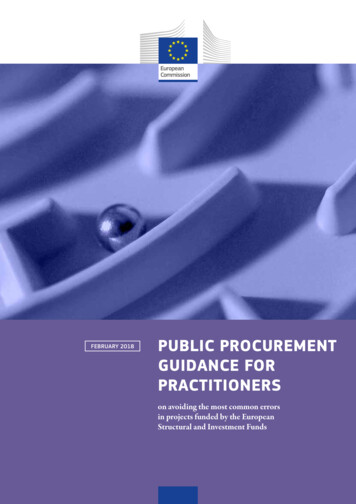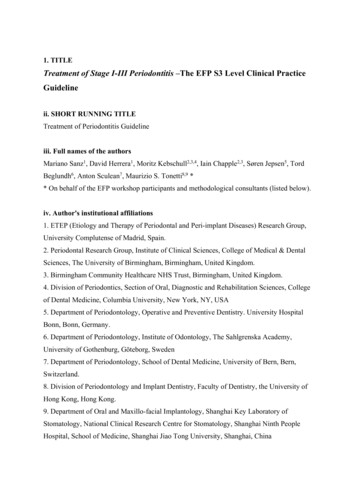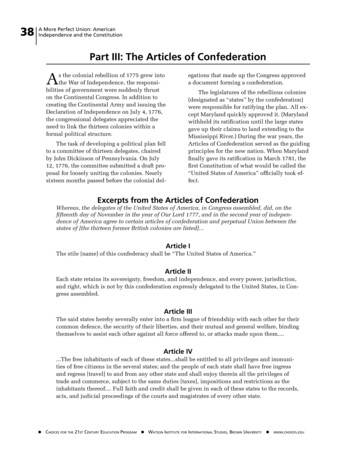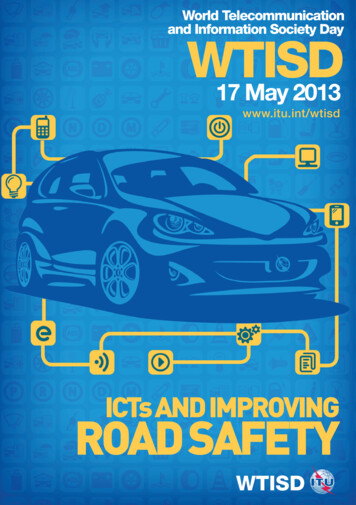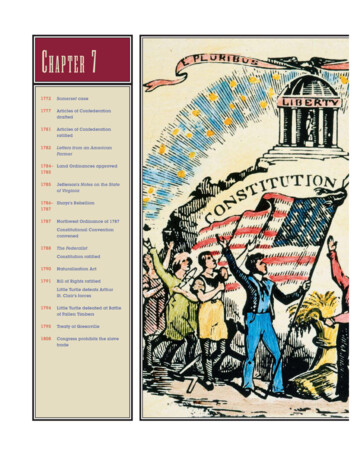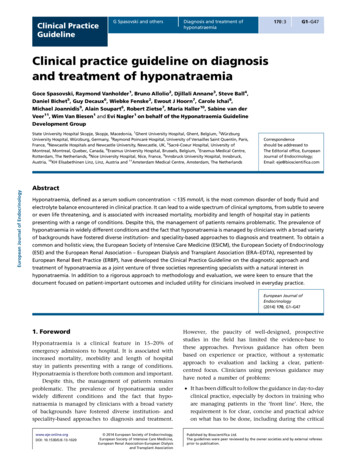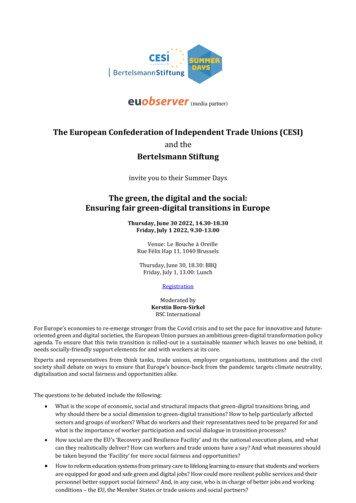
Transcription
(media partner)The European Confederation of Independent Trade Unions (CESI)and theBertelsmann Stiftunginvite you to their Summer DaysThe green, the digital and the social:Ensuring fair green-digital transitions in EuropeThursday, June 30 2022, 14.30-18.30Friday, July 1 2022, 9.30-13.00Venue: Le Bouche à OreilleRue Félix Hap 11, 1040 BrusselsThursday, June 30, 18.30: BBQFriday, July 1, 13.00: LunchRegistrationModerated byKerstin Born-SirkelBSC InternationalFor Europe’s economies to re-emerge stronger from the Covid crisis and to set the pace for innovative and futureoriented green and digital societies, the European Union pursues an ambitious green-digital transformation policyagenda. To ensure that this twin transition is rolled-out in a sustainable manner which leaves no one behind, itneeds socially-friendly support elements for and with workers at its core.Experts and representatives from think tanks, trade unions, employer organisations, institutions and the civilsociety shall debate on ways to ensure that Europe’s bounce-back from the pandemic targets climate neutrality,digitalisation and social fairness and opportunities alike.The questions to be debated include the following: What is the scope of economic, social and structural impacts that green-digital transitions bring, andwhy should there be a social dimension to green-digital transitions? How to help particularly affectedsectors and groups of workers? What do workers and their representatives need to be prepared for andwhat is the importance of worker participation and social dialogue in transition processes? How social are the EU’s ‘Recovery and Resilience Facility’ and its the national execution plans, and whatcan they realistically deliver? How can workers and trade unions have a say? And what measures shouldbe taken beyond the ‘Facility’ for more social fairness and opportunities? How to reform education systems from primary care to lifelong learning to ensure that students and workersare equipped for good and safe green and digital jobs? How could more resilient public services and theirpersonnel better support social fairness? And, in any case, who is in charge of better jobs and workingconditions – the EU, the Member States or trade unions and social partners?
Thursday, June 30 14.30-18.30Opening of the Summer DaysRomain Wolff, President of CESIKeynote – The green, the digital, and the social: Ensuring fair transitionsMEP Eva Maydell, President of the European Movement International – by video messageInclusive green-digital transitionsMoustapha Kamal Gueye, Global Coordinator of the Green Jobs Programme of the ILOTowards a more social EuropeMEP Leila Chaibi, Vice-Chair of the Committee on Employment and Social Affairs of theEuropean ParliamentCoffee breakPart 1Worker-centred green-digital transitions(see full description at the end of the programme)Workshop 1Workshop 2How can the digital &sustainabletransformation be donein a socially fair way?How to ensure asuccessfultransformation throughparticipation?Workshop 3What priorities for sociallyfair green-digital transitionprocesses in the Europeanlabour markets andeconomies?Plenary wrap-up - breakout sessions reportsBBQ from 18:30 o’clock
Friday, July 1 9.30-13.00Keynote – Europe in transition: How can the EU ensure that the transitions happen in a socially fair way?Nicolas Schmit, European Commissioner for Jobs and Social Rights – by video messageGlobal challenges for sustainability: towards a greener planet and a fairer worldMark Keese, Head of the Skills and Employability Division in the Directorate for Employment, Labour andSocial Affairs at the OECDCovid fallouts on workers and employment conditions – The role of the EUOliver Röpke, President of the Workers’ Group of the European Economic and Social CommitteeThe green, the digital, and the social: Ensuring fair transitionsMEP Dragoş Pîslaru, Chair of the Committee on Employment and Social Affairs of theEuropean ParliamentMEP Dimitrios Papadimoulis, Vice-President of the European Parliament – by video messagePart 2A Recovery and Resilience Facility for and with workers(see full description at the end of the programme)Workshop 4Workshop 5Workshop 6A social Recovery andResilience Facility andnational execution plans?What can the Recovery andResilience Facility deliver?How can workers and tradeunions have a say?Coffee breakPart 3Social fairness beyond the Recovery and Resilience Facility(see full description at the end of the programme)Workshop 7How to ensure good and safegreen and digital jobs?Workshop 8Workshop 9More resilient publicservices and personnel formore social fairness?Are we ready to seize themoment to build a more inclusivelabour market?Plenary wrap-up - breakout sessions reportsConclusionsKlaus Heeger, Secretary-General, CESILunch from 13:00 o’clock
Workshop descriptionsPart 1Worker-centred green-digital transitionsBertelsmann StiftungifokCESITitleTitleTitleThe double transformation of companies: How Becoming part of the process: How to ensure a The role of trade unions in a changing world:can the digital & sustainable transformation be successful transformation through participation? What priorities for socially fair green-digitaltransition processes in the European labourdone in a socially fair way?markets and economies?Explanatory linesExplanatory linesExplanatory linesIn the EU’s attempts to reshape the Europeaneconomy and make it more innovative al reforms have been put at the coreof the EU strategy. While the need for a digitalizedand climate-neutral economy is undoubtedly ofcentral importance, it is crucial to identify thepotential impacts of these ambitious plans onemployment, workers and citizens at large and toensure that the green-digital transitions happen ina socially-just way. How will the transition to thisnew era affect our labour markets and societiesand how to reconcile digital and green objectiveswith social aims?It needs more than just policy-makers: In ourmodern, digital and diverse society, participationand dialogue with the public are key to asuccessful transformation. Ifok is a market leaderfor civic and stakeholder participation in Germanyand has been working for 27 years at state, federaland European level. Ifok is a shaper of change,bringing people together and working to developsustaining solutions for tomorrow’s society. ion can be accomplished – each ofthem comes with its own particular focus, such astackling structural changes of the automobileindustry, the exit of lignite in Eastern Germanyand role of vulnerable people in energy transition.To ensure that no one will be left behind in greendigital transitions, they must be designed andimplemented in a socially balanced and fairmanner for workers. Which are short- and longterm opportunities and challenges that greendigital transitions can encounter in the world ofwork? What are possible impacts andconsequencesonemployment,workingconditions and skills of workers and how canadverse repercussions be mitigated and benefitsexploited? Which strategies will be essential fortrade unions to mitigate the negativedevelopments in the transitions?
Workshop descriptionsPart 2A Recovery and Resilience Facility for and with workersEuropean CommissionCEPSCESITitleTitleTitlePaving the way out of the pandemic: A social The Recovery and Resilience Facility in depth:Recovery and Resilience Facility and national What can it deliver?execution plans?The role of workers and trade unions in therecovery and resilience programmes: How canthey have a say?Explanatory linesExplanatory linesExplanatory linesThe EU Recovery and Resilience Facility (RRF) aimsto support investments and reforms across theUnion and help Member States address adverseimpacts of the Covid-19 pandemic. To make oursocieties more resilient, sustainable and betterprepared for future crises and challenges, weneed to ensure that the RRF and its nationalrecovery and resilience plans also put a strongemphasis on social objectives. How does and willthe RRF contribute to the promotion of socialjustice and welfare in Europe and the MemberStates?Now that the national recovery and resilienceplans are being implemented, a question thatremains to be answered is: what can the Recoveryand Resilience Facility realistically deliver? Toanswer, exploring the progress in theimplementation of milestones and targets is notenough. A look at the credibility of the proposedreforms, the governance of the plans and theadditionality of the proposed public investmentsis key to understand the long-term impact of theplans.After more than two years of radical structuralchanges in the labour markets of the MemberStates due to the Covid pandemic, the world ofwork needs effective support mechanisms thatwill safeguard the existing jobs and create newquality jobs and better working conditions. TheEU’s Recovery and Resilience Facility (FFR) canhave the potential to revive labour markets to thisend, if used in a targeted way. For this, workersand their representatives should work hand-inhand with governments and authorities to ensurethat the resilience facilities will supportemployment and decent work. But how can theyhave a say in this process?
Workshop descriptionsPart 3Social fairness beyond the ‘Recovery and Resilience Facility’CESI YouthEPCOECDTitleTitleTitleFrom the primary school to lifelong learning: Towards more social fairness: Could more Creating inclusive labour markets: Are we readyHow to ensure good and safe green and digital resilient public services and their personnel be to seize the moment?the answer?jobs?Explanatory linesExplanatory linesExplanatory linesIn today’s rapidly evolving labour markets and jobprofiles, it is crucial to equip students and workerswith the essential tools needed to succeed in theeducation-to-job-transition. The widespreadintensification of work and the highcompetitiveness in modern labour markets, as wellas the digital and green transitions that areunderway in the economy are expected todramatically change our societies and ways we liveand work. This will also require new approachesand strategies that will provide students andworkers with the necessary knowledge and skillsfor their professional careers until retirement. Ourworld is changing, and our education and trainingsystems are obliged to adapt. How to ensure goodand safe green and digital jobs?The Covid pandemic showed perhaps even moredramatically than previous crises that the publicsector is of vital importance to the smoothfunctioning of our societies and welfare systems.In these unprecedented times that the Covidpandemic has been, public services preserved oursocial fabric and offered protection to the mostvulnerable. As a next crisis – of yet unknownnature and at a yet unknown point of time – surelyalways comes, the latest being the fallout of theRussian aggression, what is needed to root astrongpublic service agenda in Europe? How canwe make sure that the necessary in-advanceinvestments in resilient and performing publicadministrations and services is made so that theycan ensure social fairness also in times of crises?Labour markets are inclusive when everyone ofworking age has fair access to opportunities forremunerated work. Especially during the rapidstructural changes in today’s labour markets andeconomies, vulnerable and disadvantaged groupsof our communities need support that willfacilitate participation in work, remove barriers,prevent in-work poverty and help them keep theirjobs. How can European governments reinforcepathways to quality employment for as many aspossible?Benefit from a 50% discount for a yearly subscription to the EUobserver. Support independentjournalism and benefit from clear and concise news. Enter PARTNER50 on check-out atwww.euobserver.com/joinMedia partner
(media partner) The European Confederation of Independent Trade Unions (CESI) and the Bertelsmann Stiftung invite you to their Summer Days The green, the digital and the social: Ensuring fair green-digital transitions in Europe Thursday, June 30 2022, 14.30-18.30 Friday, July 1 2022, 9.30-13.00 Venue: Le Bouche à Oreille




